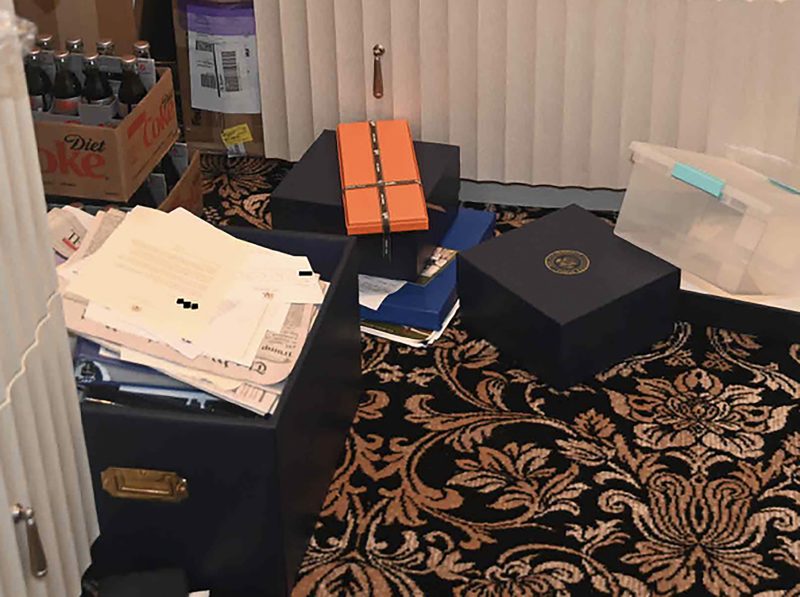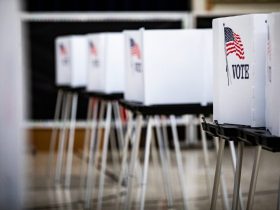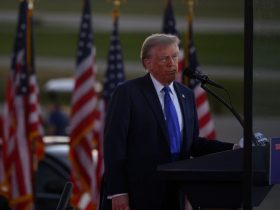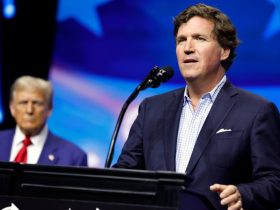FORT PIERCE, Fla. — Special counsel Jack Smith revealed new photos in a court filing Monday evening that depict how haphazardly Donald Trump stored classified materials at his Florida property post-presidency, with golf shirts stuffed into boxes alongside the sensitive materials, newspaper clippings and other mementos.
The images — a grab-bag of national security secrets, souvenirs and various odds-and-ends — are part of prosecutors’ effort to show that the dozens of boxes containing government materials at Trump’s Mar-a-Lago residence and private club were so messy and disorganized that investigators could not preserve the precise order of the contents they retrieved.
The Justice Department has released photos of the classified documents before, but the new filing offers the largest number of such images. In one, a sensitive document with redactions sits in a box atop of an edition of The Washington Post with a front-page story describing Trump’s difficult relationship with the FBI. Next to that box sit two cases of Diet Coke bottles.
Smith filed the photos in response to an argument from Trump that the criminal charges against him should be dismissed because investigators messed up the precise order of the boxes’ contents.
Trump, the former president and presumptive Republican nominee in this year’s election, faces 40 counts of willfully retaining classified information and obstructing the government’s efforts to retrieve them, serious national-security violations that typically would bring prison time if convicted.
His trial, originally set for May, has been postponed indefinitely as U.S. District Court Judge Aileen M. Cannon hears a slew of dismissal and other motions from Trump’s legal team, many of them far-fetched, and deals with other pretrial matters.
In one of those motions, filed June 10, lawyers for Trump wrote that by not precisely preserving an exact copy of the contents as they were found, investigators essentially destroyed evidence and therefore made it difficult for Trump to employ some defenses at trial.
Trump’s attorneys suggested that they may try to argue the classified documents were buried deep in the boxes with a mishmash of personal mementos, and their client simply lost the sensitive documents and lacked the kind of knowledge that would amount to criminal behavior.
Their argument, known as a “spoliation of evidence” motion, typically carries a high legal threshold. Defense lawyers would have to show that prosecutors intentionally destroyed evidence to convince a judge to dismiss the case.
In his response to the motion, the special counsel said Trump’s claims are meritless and contradicted by the evidence. The government filing includes transcripts in which people who worked for Trump told investigators the former president knew exactly where the boxes were and what was in them, often directing employees to bring a specific box on a certain occasion.
One employee told a prosecutor that they used the phrase “A Beautiful Mind” to describe the boxes — a reference to the Russell Crowe movie about a math genius — because Trump knew everything about their contents.
Still, prosecutors said that if Trump wanted to mount the defense that he didn’t know what was in the boxes, any movement of the retrieved items by investigators would not preclude him from doing so.
“Against this backdrop of the haphazard manner in which Trump chose to maintain his boxes, he now claims that the precise order of the items within the boxes when they left the White House was critical to his defense, and, what’s more, that FBI agents executing the search warrant in August 2022 should have known that,” Smith wrote in the filing. “But because the overall contents of each box have not changed, Trump can argue both of those things and has everything he needs to do so. Nothing has been lost, much less destroyed, and there has been no bad faith.”
Judges typically rule on long-shot motions without holding hearings. Cannon’s tendency to hold hearings on many of Trump’s requests has created a backlog of key decisions, delaying the original late-May trial start date and making it unlikely Trump will stand trial in Florida before the presidential election.
She has not scheduled a hearing on Trump’s spoliation claim, though she could still do so.
If Trump — who was convicted last month on separate state charges of falsifying records in New York — wins the presidency in November, he could appoint an attorney general who would seek to drop the federal charges against him. It is also against Justice Department policy to prosecute a sitting president.
Cannon held a hearing Monday morning on Trump’s request to dismiss the Florida case based on what his attorneys argued was the unconstitutional funding of the special counsel. On Tuesday, she is holding two sessions on different issues, including Trump’s claims that investigators provided misleading claims on the affidavit they used to obtain a search warrant for Mar-a-Lago.










